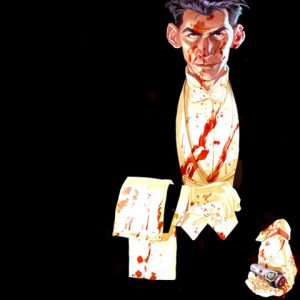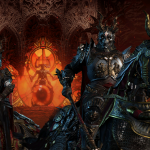The lead designer of The Elder Scrolls 5: Skyrim has discussed the difference in design philosophy between Bethesda games and Larian’s Baldur’s Gate 3.
Speaking in a fascinating interview with MinnMax, ex-Bethesda designer Bruce Nesmith expressed his love for Baldur’s Gate and Dungeons & Dragons, before delving deep into the difference in design philosophy between the likes of Fallout and The Elder Scrolls, and the critically acclaimed Baldur’s Gate 3.
“I think [Baldur’s Gate 3] is a triumph of trying to make the tabletop experience actually happen right there in the computer,” Nesmith said. “My hat’s off to Larian and the groups there.”
Baldur’s Gate 3 is praised for doing perhaps the greatest job yet of recreating the chaotic, everything matters, anything is possible gameplay Dungeons & Dragons is famous for. It is a game in which a seemingly innocuous choice can result in great swathes of story falling by the wayside, a game in which some party members will simply walk out on you — or refuse to join forces with you in the first place — if you make the wrong move (Minthara, I’m looking at you).
More than that, Baldur’s Gate 3 is a game that rewards experimentation. Remarkably, it copes with players’ outlandish ideas, sometimes with unique dialogue or story development most players would never normally experience. In the weeks following Baldur’s Gate 3’s launch, Matt Mercer’s ‘very smart’ crate-stacking trick that got him to the top of a castle went viral, as did the ‘Owlbear from the top rope’ attack that deals enough damage to take down pretty much anything.
Bethesda games, including the recently released Starfield, are built differently. Choice and consequence is often limited in scope, with side quests playing out almost in isolation to the main quest so that they can be experienced by as many player types as possible. Bethesda games revolve around the awe and wonder that comes from exploring a vast open world. See those mountains over there? You can go there, any time. That’s the Bethesda promise, and the developer has over the years done a wonderful job keeping it.
In the interview, Nesmith acknowledged many of these differences, and praised Larian’s bravery when it came to locking off content. “The thing that at Bethesda we could never get ourselves to do, is that they [Larian] poked into all the darkest corners,” Nesmith said. “They’ve come out and said, quite bluntly, ‘we don’t care if only 1% of the players will ever see this. Those 1% that do are gonna be happy, and they will tell the other 99%, who will then be happy that the option existed.’
“At Bethesda, the games we were making were so big we had to take the approach of, well, everybody’s got to be able to do this at some point. We can’t lock off content that way. And you can see it in our games — we don’t. You can get to be the heads of all the guilds, you can be friends with all the companions, you can go to all the places. Nothing is off-limits.
“But when you play Baldur’s Gate 3 you get the impression, rightly so, that this decision I’m about to make will close off parts of the game and open up others. It’s meaningful. That means something. That’s a big deal.
“You have to acknowledge that — I’m just going to pull numbers out of my ass here — any one player is only going to see 50% of the game. That’s it. And furthermore, the work that I do as an individual developer may only be seen by 5% of the people out there. That’s a little disheartening. Hey bro, what parts do you work on? Oh this thing over here that hardly anybody ever gets to.”
Nesmith went on to explain Bethesda’s approach: “We were also in the business of making games that people would play for hundreds of hours. If you cut out 50% of your game, they’re not gonna play for hundreds of hours. Now they’ve only got 50 hours they can play because you cut off half of it.
“You got benefit for that [points to Baldur’s Gate 3] – every decision feels highly meaningful. Whereas, very few of the decisions in a Bethesda game feel highly meaningful, you maybe get to make three or four of those. We try to make those really big and important, but you get to make three or four highly important decisions in the game.”
It is perhaps unfair to compare Baldur’s Gate 3 with Starfield or any other Bethesda game, given their different design goals, but such comparisons are inevitable. Baldur’s Gate 3, let’s remember, launched just a month before Starfield, a release date that was brought forward to avoid Bethesda’s behemoth coming out in September. In the end, Baldur’s Gate 3 going first probably didn’t do Starfield any favours. The key question now is, will Todd Howard and co change their approach in any way for The Elder Scrolls 6?
Wesley is the UK News Editor for IGN. Find him on Twitter at @wyp100. You can reach Wesley at [email protected] or confidentially at [email protected].























-150x150.jpg)
